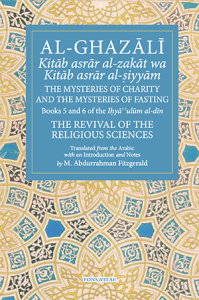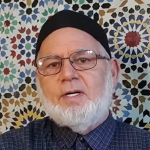Al-Ghazali The Mysteries of Charity and the Mysteries of Fasting (Ihya Ulumuddin Series No. 5 & 6)

Author: Imām Al-Ghazali
Translator: M. Abdurrahman Fitzgerald
Publisher: Fons Vitae Publishing
Year of Publication: 2019
Print Length: 160 pages
Genre: Islamic Studies / Quranic Studies; Theology, Ethics and Philosophy; Islamic Law & Jurisprudence, Science; Qur’anic Reflection, Supplication & Prayers; Non-Fiction / Religious Studies
Topic: Islam, Qur’an, Charity, Alms, Fasting/Sawm, Pillars of Islam, Islamic Pillars of Faith
In the Mysteries of Charity and Its Important Elements (Kitab asrar al zakat wa-muhimatiha; book 5), and the Mysteries of Fasting and Its Important Elements (Kitab asrar al-iyyam wa-muhimatiha; book 6), of the forty books of the Revival of the Religious Sciences (Iya ulum al-din), Abu Hamid al-Ghazali explains the inner and outer meanings of charity and fasting, two pillars of worship for Muslims. These are two of the five books that deal with the inner dimensions of Islamic worship.
In book 5 al-Ghazali begins with a discussion of the various kinds of zakat and the conditions under which they become obligatory. He explains the manners related to zakat and its inward and outward conditions. He then discusses the recipients of zakat, who qualifies for it and in what circumstances, and the manners related to receiving it. Finally, al-Ghazali explains charity and its virtues.
In book 6 al-Ghazali begins with the outward obligations and sunna elements of fasting, and what is required if the fast is broken. He explains the mysteries of fasting and its inner conditions. Finally, he discusses the voluntary fasts and their order in superogatory worship.
This readable yet comprehensive work covers an array of issues from the essential outward aspects of paying charity, to the inward aspects of the state of the heart during the fast and how to humble oneself completely. As a practical, yet profound book, it is an indispensable guide for Muslims who seek a deeper comprehension of these two fundamental practices for Muslims, and for all those interested in understanding the meaning and role of charity and fasting in Islam.
Table of Contents
Editor’s Note
Biography of Imām al-Ghazālī
About the Revival of the Religious Sciences
Translator’s Introduction
Acknowledgments
BOOK 5: THE MYSTERIES OF CHARITY
Author’s Introduction
Chapter 1
On the Different Kinds of Zakāt and the Conditions Under Which It Becomes Obligatory
Zakāt on Livestock / Zakāt on Crops / Zakāt on Gold and Silver / Zakāt on Merchandise / Zakāt on Burief Treasure and Mines / The Charity for Breaking the Fast (Ṣadaqat al fiṭr)
Chapter 2
On the Payment of Zakāt and Its Inward and Outward Requisites
On the Outward Requisites / The Fine Points of the Inward Manner / The Six Qualities
Chapter 3
On the Recipient of Charity, the Conditions Under
Which Someone Qualifies for It, and the Recipient’s Duty on Receiving It / The Conditions Under Which Someone Qualifies to Receive Charity / On the Duties of the One Who Receives Zakāt
Chapter 4
On Voluntary Charity, Its Virtues, and the Manners Related to Receiving It and Giving It
On the Virtues of Charity / On Giving Charity Privately and Publicly / On Giving Charity Publicly / Is it Better to Accept Voluntary Charity (Ṣadaqa) or Zakāt?
BOOK 6: THE MYSTERIES OF FASTING
Translator’s Introduction
Author’s Introduction
Chapter 1
On the Outward Obligations and Sunna Elements of Fasting, and What Is Required If the Fast Is Broken
If the Fast is Broken / The Six Sunna Elements of Fasting
Chapter 2
On the Mysteries of Fasting and Its Inner Conditions
Chapter 3
On Voluntary Fasting and Its Order in Supererogatory Worship
Bibliography
Indexes: Index of Qur’ān Verses / Index of Hadīth / Index of Names and Places / Subject Index
About the Translator

Imām Abu Hamid al-Ghazali is a 11th century Muslim scholar. He was one of the most prominent and influential philosophers, theologians, jurists, and mystics of Sunni Islam. Al-Ghazālī was born at Ṭūs (near Mashhad in eastern Iran) and was educated there, then in Jorjān, and finally at Nishapur (Neyshābūr), where his teacher was al-Juwaynī, who earned the title of imām al-ḥaramayn (the imam of the two sacred cities of Mecca and Medina). He was active at a time when Sunni theology had just passed through its consolidation and entered a period of intense challenges from Shiite Ismâ’îlite theology and the Arabic tradition of Aristotelian philosophy (falsafa). Al-Ghazâlî understood the importance of falsafa and developed a complex response that rejected and condemned some of its teachings, while it also allowed him to accept and apply others. His great work, Iḥyāʾ ʿulūm al-dīn or Ihya Ulumuddin (“The Revival of the Religious Sciences”), made Sufism (Islamic mysticism) an acceptable part of orthodox Islam.
Source: https://plato.stanford.edu/entries/al-ghazali/
More from Imam al-Ghazali in this library, click here.

Michael Abdurrahman Fitzgerald is the Director of the Center for Language and Culture, Marrakech, and the author of several books, including Ibn Qayyim al-Jawziyya on the Invocation of God.
Source: https://www.barnesandnoble.com/w/the-mysteries-of-the-prayer-and-its-important-elements-michael-abdurrahman-fitzgerald/1128932461
More from M. Abdurrahman Fitzgerald in this library, click here.
